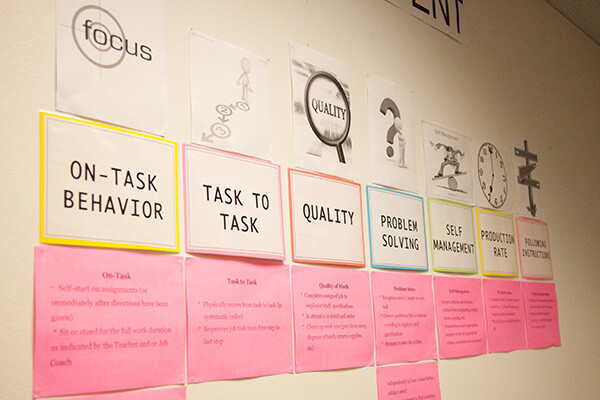Last modified: May 9, 2017
Program Descriptions
 Provo Transition Services (East Bay Post High) provides a continuum of services to meet the needs of each individual student. Our continuum of services is built around the four pillars of Transition Services: Education and Training, Employment and
Independent Living (as needed).
Provo Transition Services (East Bay Post High) provides a continuum of services to meet the needs of each individual student. Our continuum of services is built around the four pillars of Transition Services: Education and Training, Employment and
Independent Living (as needed).
Phases of the Provo Transition Services (East Bay Post High) continuum is designed to create educational activities outside of the classroom and is based on the student’s interests and needs. Students in each Phase participate extensively (as appropriate) in the community and with adult agencies for learning activities and experiences. Each Phase focuses on vocational training, functional academic skills, independent/adult living skills, social skills, transportation training and community access. Students and families are connected to adult agencies that provide on-going and continued support as needed.
The Work Based Learning Evaluation (WBL) and Social Work Based Learning Evaluation (SWBL) is a prompt-based data collection system used to measure student progress in seven core vocational and social areas. Each vocational and social area of focus is operationalized. The WBL and SWBL measure the amount of prompts a student is given in each vocational area and according to the objectives listed for each. The WBL and SWBL inform us of student progress towards independence. A student gains greater independence as the amount of prompts a student receives decreases. Reliability checks are built into the system to ensure a reliable measure of the amount of prompts given.
The WBL allows instructors and teams to make data based decisions regarding which Transition Phase a student should participate in. Movement from Phase 1 to Phase 5 demonstrates an increased level of independence and is based on WBL data results.
- Phase I – Is designed is to provide specialized instruction for students in the areas of daily living skills, choice making skills and basic vocational skills. Students practice and engage in recreation and leisure training and practice generalizing skills to their home/residential setting. Students require direct supervision and a high level of support.
- Phase II – Is designed to assist students in developing and practicing essential work skills in a supported employment environment both on campus and in the community. Students develop work skills and practice appropriate behavior by completing in-house work tasks. Students generalize their skills at various worksites in the community and with the support of a vocational trainer. Students require some direct supervision and moderate level of support.
- Phase III – Is designed to assist students in developing and practicing essential work skills in the community. Students work in an enclave group at various locations in the community and with the support of a vocational trainer. Students work towards independent vocational placement. Students utilize public transportation with support, to travel throughout the community. Students require some direct supervision and moderate support, fading towards consultation and decreased support.
- Phase IV – Is designed to assist students in developing and practicing essential work skills in the community. Students develop and are accountable for their individual schedule. Students are prepared to follow their schedule with fading support from vocational trainers, etc. Vocational Trainers assist students in identifying natural supports in work settings and in the community to assist them as needed. Students travel in the community independently or with a peer using public transportation or other modes, to commute to worksites, community activities, etc. Students require minimal support and consultation from vocational trainers and instructors.
- Phase V – Is designed to assist students in developing and practicing essential work skills in the community. Students are employed or prepared to become employed and participate in competitive paid employment or in post secondary education or trade programs. Students receive assistance connecting with adult agencies and other resources that can provide assistance. Students are independent and travel throughout the community using various modes of transportation. Students require distant support, consultation and minimal support and supervision from program staff.
